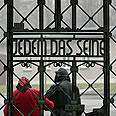
A former Nazi concentration camp guard who has lived quietly in the western US for more than 50 years took his fight against deportation to the nation's highest immigration court Thursday, arguing that he shouldn't be punished because he served in Hitler's army against his will.
The Board of Immigration Appeals in Falls Church heard the appeal from 88-year-old Anton Geiser of Sharon, Pennsylvania, who acknowledges serving in the Nazi SS as a guard in the Sachsenhausen and Buchenwald concentration camps. A federal judge ordered him deported in 2010.
Related articles:
- Op-ed: Nazis on the court
- German states push ahead with Neo-Nazi party ban
- Nazi camp clip combats Shoah denial
But his lawyer argued that the court should have considered that Geiser was forced to join the SS against his will as a 17-year-old.
Government lawyers argued to uphold the deportation. They said federal law places former Nazis in a harsher immigration category, and no exceptions should be made because of compulsory service.
Adrian Roe, Geiser's lawyer, acknowledged that Congress did indeed place Nazis in a separate, harsher category when it comes to determining their rights to immigrate to and live in the US But he said that not everyone conscripted into the Hitler war machine is truly a Nazi.
"The label Nazi itself sort of goes to belief," Roe said. "If they were a true believer, we don't want them here. If they were a forced participant, are they really a Nazi?"
Geiser, who was recently hospitalized, did not attend Thursday's hearing. He came to the US in 1956 and was naturalized in 1962. He lived in Sharon, about 75 miles north of Pittsburgh, where he worked in a steel mill for decades and raised five children.
'I was not proud where I served'
Justice Department lawyer Susan Siegal questioned whether Geiser's service as a camp guard was truly involuntary. She said he could have requested a transfer back to the Russian front, where he was initially serving, or that he could have simply walked away from service or defied immoral orders. She said the Nuremberg trials after World War II and military code established the precedent that following immoral orders is not an adequate defense.
"I'm sorry - Mr. Geiser did engage in crimes against humanity," Siegal said.
Roe took exception to the portrayal of Geiser as a war criminal. Geiser says he was forced to join the SS in 1942, and that he never killed anyone, though tens of thousands are believed to have died at Buchenwald and Sachsenhausen.
Geiser does not dispute that the Nazi camps were horrific, and he previously told prosecutors he was ashamed of his service. "I was not proud where I served and I didn't like it then and I didn't like it now," he said.
Most of the hearing, though, dealt not with Geiser's actions during the war but on narrow questions of legal precedent. Roe argued that a 2009 Supreme Court decision requires immigration judges to consider whether an alleged perpetrator of persecution was doing so voluntarily. More broadly, he said US law in nearly all aspects takes into account whether a person was forced to act against his will, and he said the same principles should be extended to Geiser's case.
The three members of the Board that heard the case - two appointed by Republicans, one by a Democrat - are expected to issue their ruling in a few months. While it is the highest immigration court, it is an administrative body and its rulings are subject to review by federal judges and the Supreme Court. It is expected that the board's ruling will be appealed by the losing side.
- Follow Ynetnews on Facebook and Twitter
- Receive Ynetnews updates
directly to your desktop















